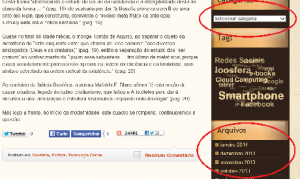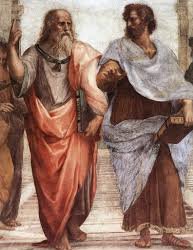
Arquivo para January 23rd, 2014
Tampering in this blog
Dear Readers: I inform you of that some changes were observed in the content and design in this blog, which are not the responsibility of the author, I apologize if anything improper or offensive is found, but we are providing to review all content. In particular the right columns of the blog categories and files were changed, also some posts are gone or with changed content.
observed in the content and design in this blog, which are not the responsibility of the author, I apologize if anything improper or offensive is found, but we are providing to review all content. In particular the right columns of the blog categories and files were changed, also some posts are gone or with changed content.
While you’re traveling, as far as possible I am working to put the entire site and its contents back in order, thank you for understanding.
The question of being in classical philosophy
Whatever the scope of social life, there is a nuisance,  generally seen as economic, security, well-being, but it is certain that something is not right in civilization.
generally seen as economic, security, well-being, but it is certain that something is not right in civilization.
How did this process in Western culture, in particular, but which influenced the whole world? It is essential that we respond to meet again our “being” and its path.
.
We know that every philosophy and Western life had influence of classical philosophy, and it comes from Aristotle and Plato , essentially , but a break would happen at the end of the Middle Ages .
As indicated in our author we’re reading Introduction to ontology Mafalda F. Blanc) ” will the object of first philosophy suffer a notable restriction , first to the study of the substance , then the study of pure form , as it exists in the first engine made ” with this product it would be a ” first mover ” that put everything in motion , then the entity ” will constitute itself as a science of the substance and, second, as theology ” (pp. 18 ) .
Thus Aristotle first philosophy should clarify “the essence of the substance, its causes … should focus on the question of the reasons or causes of sensitive substances, namely, the analysis of its forms and essential, responsible for updating the virtues of the matter.” (pp. 18 )
Thus ” identifying the study of being and intelligibility to the substance of this plan to the way … “(pp. 19 ) he would eventually give “first philosophy to the profile of an onto – theo-logy, which would henceforth the meta-physical ontology subsequent to the Kantian critique.” (pp. 19 )
Near the end of the Middle Ages, the monk Thomas Aquinas , to separate the object from the metaphysical ” beings as beings ” that calls ” ens comune ” ” to many analogados (God and creatures) ” (pp. 19), then the separation of the study of “being common ” knowledge of “Ipsum this subsistens … last end of metaphysics , because absolutely first cause not only the order of efficiency and purpose, but also and above all in radical order of existence.” (pp. 20 )
Unlike the philosophical fallacy, the author Mafalda F. Blanc says ” is this notion of creative cause , the legacy of Judeo-Christianity, which lacked Aristotle to give a joint and metaphysics as onto- theo-logy systematic structure ” (pp. 20).
But just ahead, at the beginning of modernity, this table would break, we will see.

